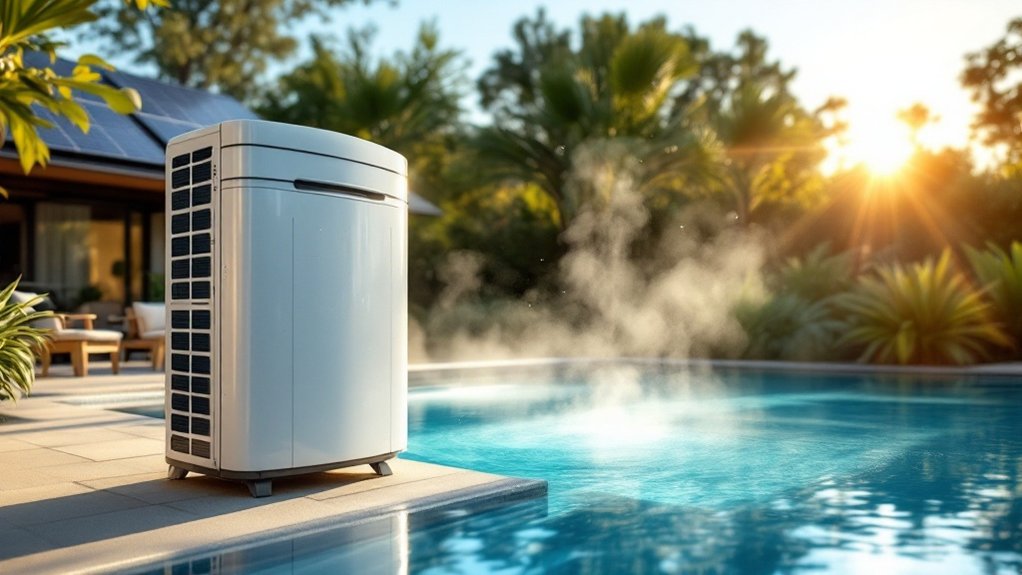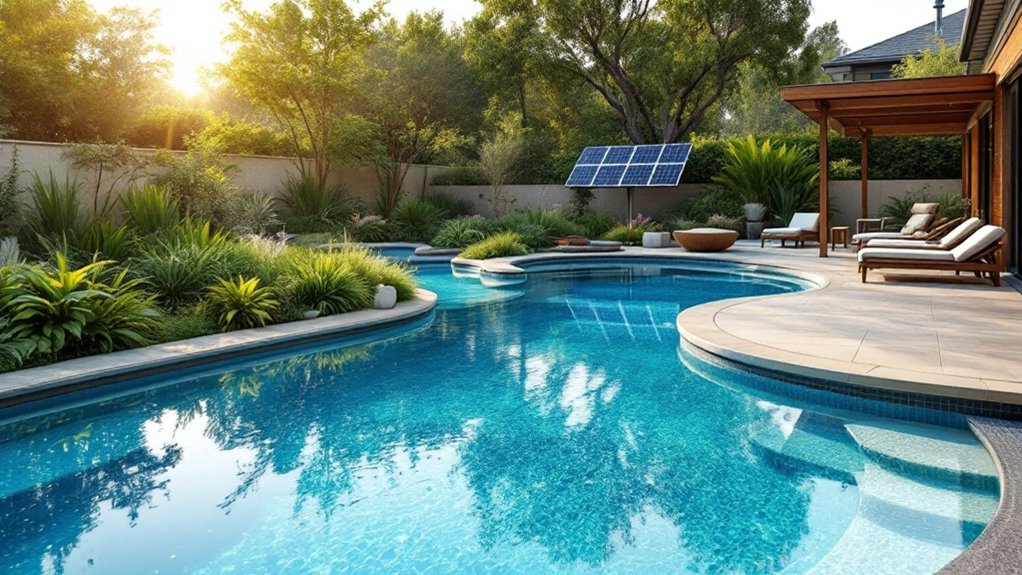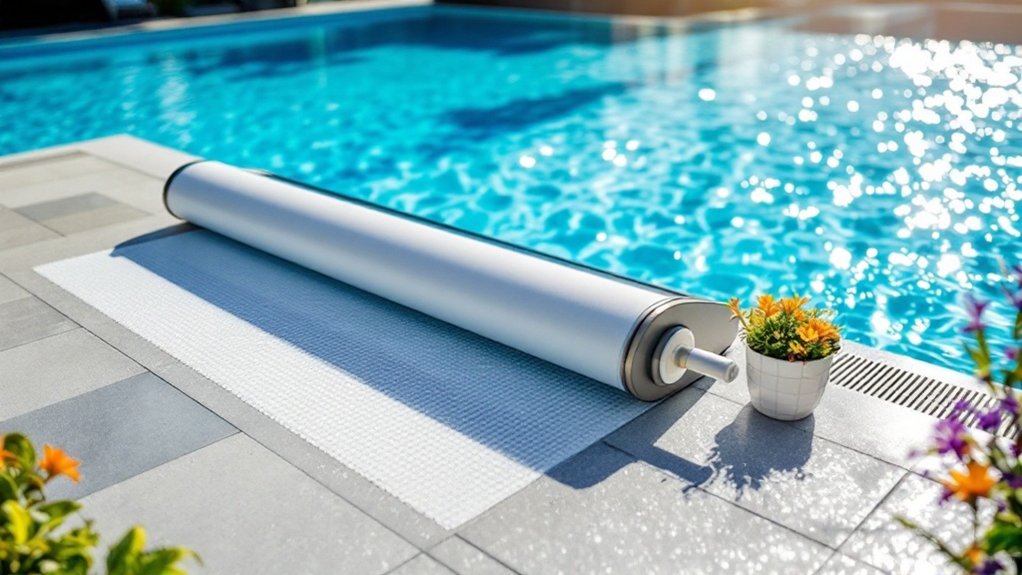Energy-efficient pool heating solutions are essential for optimizing energy use and minimizing costs. They incorporate various strategies, including insulation and automated covers, to reduce heat loss. Different types of heating systems, such as solar heaters and heat pumps, further enhance efficiency. Understanding how these elements work together can greatly impact a pool owner’s experience. What factors truly contribute to their effectiveness?
Understanding Energy Efficiency in Pool Heating
How can pool owners maximize energy efficiency in their heating systems? Understanding the principles of energy efficiency is essential for effective pool heating. Energy efficiency refers to the ability to use less energy to achieve the same level of heating. Key factors include the insulation of the pool area, which minimizes heat loss, and the use of pool covers to retain warmth when the pool is not in use. Additionally, the timing of heating can greatly impact energy consumption; heating the pool during off-peak hours can reduce costs. Regular maintenance of the heating system guarantees peak performance, while upgrades to energy-efficient models can provide long-term savings. By prioritizing these aspects, pool owners can greatly enhance the energy efficiency of their heating systems. Regular inspections can identify potential issues that affect heating efficiency before they escalate into costly repairs.
Types of Energy-Efficient Pool Heating Systems
When considering energy-efficient pool heating systems, pool owners will find a variety of options tailored to meet their needs while minimizing energy consumption. Electric heat pumps are popular for their ability to extract heat from the air, making them efficient even in cooler temperatures. Gas heaters, while less energy-efficient, can be effective for quick heating and are suitable for larger pools. Additionally, there are hybrid heating systems that combine the strengths of heat pumps and gas heaters, optimizing energy use. Another option is the use of thermal blankets, which retain heat and reduce evaporation, enhancing overall efficiency. Each system presents distinct advantages, allowing owners to choose based on pool size, climate, and personal preferences.
Solar Pool Heaters: Harnessing the Sun’s Power
Solar pool heaters represent a cost-effective energy source that taps into the sun’s natural power. Their implementation results in minimal environmental impact, making them an eco-friendly choice for pool owners. Additionally, these systems are designed with low maintenance requirements, ensuring convenience for users.
Cost-Effective Energy Source
What could be more sustainable than harnessing the sun’s power to heat a pool? Solar pool heaters are not only eco-friendly but also cost-effective. By utilizing solar energy, homeowners can considerably reduce their energy bills compared to traditional heating methods. The initial investment in solar panels may seem high, yet the long-term savings on utility costs often outweigh these expenses. Additionally, solar systems require minimal maintenance, which contributes to their overall affordability. They can operate effectively in various climates, making them a versatile option for many. With government incentives and rebates available, the financial advantages increase further, making solar pool heaters an attractive choice for those seeking an economical and energy-efficient solution for pool heating.
Minimal Environmental Impact
Although many pool heating options contribute to environmental degradation, solar pool heaters stand out due to their minimal environmental impact. These systems utilize solar energy, a renewable resource, greatly reducing reliance on fossil fuels. By converting sunlight into heat, solar pool heaters emit no greenhouse gases during operation. Additionally, their installation often requires fewer materials compared to traditional heating systems, lowering the overall resource consumption. The use of solar energy not only decreases energy bills but also promotes sustainability by minimizing carbon footprints. As homeowners increasingly seek eco-friendly alternatives, solar pool heaters exemplify a practical solution that aligns with environmental conservation efforts, ensuring that pool enjoyment does not come at the cost of the planet.
Low Maintenance Requirements
The advantages of solar pool heaters extend beyond their minimal environmental impact to include remarkably low maintenance requirements. Unlike traditional heating systems, which often necessitate regular inspections and repairs, solar pool heaters typically require minimal upkeep. The absence of mechanical components reduces the likelihood of breakdowns, consequently saving time and money for homeowners. Routine maintenance generally involves simple tasks such as cleaning the solar panels to guarantee maximum sunlight absorption. Additionally, most solar systems are built with durable materials designed to withstand environmental elements, further minimizing the need for extensive repairs. This low-maintenance aspect not only enhances the longevity of the system but also contributes to its overall energy efficiency, making solar pool heaters a practical choice for pool owners.
Heat Pumps: Efficiently Extracting Heat From the Air
Heat pumps serve as a highly efficient solution for pool heating by harnessing ambient air, even in cooler temperatures, to elevate water temperatures. These devices operate by extracting heat from the surrounding air and transferring it to the pool water, utilizing a refrigeration cycle. This method allows heat pumps to generate three to five times more energy than they consume, making them a cost-effective choice for homeowners. Their efficiency is particularly notable in mild climates, where they can operate effectively year-round. Additionally, heat pumps contribute to sustainability by reducing reliance on fossil fuels and minimizing greenhouse gas emissions. As a result, they represent an increasingly popular option for environmentally conscious pool owners seeking energy-efficient heating solutions.
Gas Heaters: Balancing Cost and Efficiency
Gas heaters offer a unique balance between upfront costs and operational efficiency for pool owners. An analysis of operating costs alongside efficiency ratings reveals important insights into their long-term value. Understanding these factors is essential for making informed decisions about pool heating solutions. Additionally, modern gas pool heaters boast energy efficiency, which contributes to significant savings over time.
Operating Cost Analysis
Operating a swimming pool efficiently requires a careful examination of the costs associated with various heating options, particularly gas heaters. Gas heaters are often favored for their rapid heating capabilities, but their operating costs can fluctuate considerably based on fuel prices and usage patterns. Analyzing these expenses involves considering both the initial investment in the heater and ongoing fuel costs. Regular maintenance is also essential, as neglect can lead to inefficiencies and increased costs over time. Pool owners should evaluate their specific needs, including the desired temperature and usage frequency, to estimate overall expenses. Ultimately, understanding these factors helps in making informed decisions that balance initial affordability with long-term operational efficiency.
Efficiency Rating Comparison
While many pool owners prioritize initial purchase prices, the efficiency ratings of gas heaters play a crucial role in long-term cost management. Efficiency ratings, usually expressed as Annual Fuel Utilization Efficiency (AFUE), indicate how effectively a heater converts fuel into heat. Higher ratings signify better fuel utilization, which translates to reduced gas consumption and lower energy bills. However, higher-efficiency models often come with increased upfront costs. As a result, pool owners must weigh the long-term savings against the initial investment. Considering factors such as local fuel prices and usage patterns can also influence the decision. By understanding the balance between cost and efficiency, pool owners can make informed choices that optimize their heating solutions.
Automated Pool Covers: Retaining Heat and Reducing Loss
Automated pool covers serve as an effective solution for retaining heat and minimizing energy loss in swimming pools. By creating a barrier between the water and the external environment, these covers greatly reduce evaporation, which is a primary source of heat loss. When not in use, the covers can be deployed quickly, ensuring that the pool remains insulated from cooler air temperatures. Additionally, many automated covers are designed to be durable and weather-resistant, further enhancing their effectiveness in providing thermal protection. Their ease of use encourages consistent application, making it more likely that pool owners will utilize them regularly. Overall, automated pool covers contribute to maintaining ideal water temperatures, leading to improved energy efficiency and reduced heating costs.
Smart Technology Integration for Optimal Performance
How can smart technology revolutionize pool heating efficiency? Integrating smart technology into pool heating systems allows for precise temperature control and energy management. Smart thermostats can learn user preferences and adjust heating schedules accordingly, ensuring that energy is conserved when the pool is not in use. In addition, these systems can be monitored remotely via smartphone applications, enabling users to make real-time adjustments based on weather conditions or personal schedules. Smart sensors can also detect temperature changes, optimizing heater performance and minimizing energy waste. By utilizing data analytics, users can identify usage patterns and make informed decisions to improve efficiency. Ultimately, smart technology enhances both the convenience and sustainability of pool heating solutions, leading to significant energy savings over time.
Maintenance Tips for Sustaining Energy Efficiency
To maintain energy efficiency in pool heating systems, regular maintenance is essential. Pool owners should check the system’s filters frequently, ensuring they are clean and free of debris to promote ideal water circulation. Additionally, inspecting insulation for wear or damage can help prevent heat loss. Keeping the pool area clear of leaves and dirt minimizes the workload on the heating system. It is also advisable to monitor the water temperature and adjust settings appropriately, avoiding unnecessary energy consumption. Scheduling professional inspections annually can catch potential issues early, ensuring the system operates at peak efficiency. By following these maintenance tips, pool owners can enhance the longevity of their heating systems while maximizing energy savings. Moreover, regular checks for sharp objects around the pool area can further reduce the risk of accidents and improve overall safety.
Frequently Asked Questions
How Much Can Energy-Efficient Pool Heating Save on Utility Bills?
The potential savings on utility bills from energy-efficient pool heating can vary considerably. Generally, users may experience reductions of 30% to 50%, depending on factors such as system type, usage patterns, and local energy rates.
What Is the Lifespan of Energy-Efficient Pool Heating Systems?
The lifespan of energy-efficient pool heating systems typically ranges from 10 to 20 years, depending on maintenance, usage, and environmental factors. Regular care can extend their longevity, ensuring peak performance throughout their operational life.
Are Energy-Efficient Pool Heaters Eligible for Tax Credits or Rebates?
Energy-efficient pool heaters may qualify for various tax credits or rebates, depending on local regulations and energy efficiency standards. Homeowners should verify eligibility through government programs or utility incentives to maximize potential savings.
Can I Install Energy-Efficient Heating Systems Myself?
The individual pondered whether self-installation of energy-efficient heating systems was feasible. While some may possess the skills for DIY projects, professional installation often guarantees peak performance, compliance with regulations, and safety standards are met effectively.
What Factors Affect the Efficiency of My Pool Heating System?
Several factors influence pool heating system efficiency, including the type of heater used, insulation quality, ambient temperature, usage patterns, and maintenance practices. Understanding these elements can help optimize heating performance and reduce energy consumption effectively.
Conclusion
To summarize, energy-efficient pool heating solutions greatly enhance comfort while minimizing environmental impact and operational costs. By employing diverse systems such as solar heaters, heat pumps, and automated covers, pool owners can effectively retain heat and optimize energy use. The integration of smart technology further amplifies efficiency through precise control and monitoring. Regular maintenance guarantees these systems operate at peak performance, making energy-efficient pool heating not only a sustainable choice but also a cost-effective investment for long-term enjoyment.




